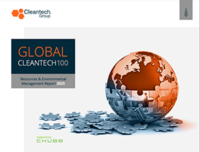Carbon Tools for Net-Zero – Takeaways from Cleantech Forum San Francisco
Cleantech Forum San Francisco – in sunny Palm Springs – finally bought together the who’s who of Cleantech Innovation in North America with some very exciting new cleantech products. Especially exciting for the Resources and Environment sector was the noticeable increase in carbon removal, scope 1-3 emissions monitoring, and offsetting interest – in large part due to the rise in net-zero commitments and the need to understand what this means.
Where is the carbon market in its development?
In seeking to working this out, the session ‘What’s Next for Carbon Accounting in 2022? A ‘trenches’ view’ from the Standards and Regulatory Agencies’ with speakers from Persefoni, OneTrust, Constellation Technology Ventures and Patch; sought to litmus test where the carbon accountancy or MRV market was in its development from a few years ago and what impact new regulations will have. Key topics included inaccuracies in modelling approaches, data capture, reporting incentives and how Chief Sustainability Officers will soon be commonplace in executive teams. The panel discussed the impact of the Partnership for Carbon Accounting Financials (PCAF) for financial institutions and how the ability to transparently measure the impact of investments will be transformative for the cleantech community and beyond.
Companies have already started to claim they have achieved ‘net-zero’ this is largely down to huge offsetting efforts over exceptional mitigation. The virtual session ‘The Development of Efficiency and Transparency in the Voluntary Carbon Markets’ hosted by TD Securities with speakers from IHI Markit, Radicle and Verra, discussed offsets and carbon removal in the evolving voluntary carbon market with raising demand, diminishing supply, the complexity of carbon markets and how to best nurture the rapidly growing market.
In summarizing IHI Markit’s developing meta registry for carbon credits which seeks to ensure transparency and reduce double counting via integrating geospatial data and flagging projects in close proximity Kathy Benini, Head of Environmental Solutions at HIS Markit outlined “How do markets grow? You need trust, confidence and integrity.”
Carbon avoidance vs. removals
When discussing market realities of carbon avoidance vs. removals and the high price of removals, Chelsea Bryant, Managing Director, Global Markets & Strategy at Radicle outlined grounding an example from one of those companies which have already claimed net-zero: “In 2020 Microsoft put out an RFP for 200 million tons of carbon removal credit, with billions submitted they deemed 1.5 million as removal credits, out of that they purchased 1.3 million. So as one company, they effectively met 1% of their demand and wiped out almost all the global supply of carbon removal credits. If one company can do this, we are not going to get where we need to go if we villainize every other type of credit.”
One of the markets integrating both monitoring and market-based ESG tools is natural gas, where companies like Xpansiv & S&P Global Platts have launched a methane performance benchmark for natural gas. Their Methane Performance Certificates (MPC) encourage action on methane upstream and midstream as MPCs provides incentives and clear price signals for lower carbon-intensive natural gas production. The ‘Minimizing Methane: The Fastest Route to Decarbonization’ session hosted by Xpansiv with speakers from Engie and Macquarie; discussed responsibly sourced gas initiatives and new market-based approaches. Methane is perceived as the ‘low-hanging fruit’ of mitigation actions for the oil and gas sector, however with misaligned incentives tools like Xpansiv’s guide action based on empirical data, auditable back to the source.
Perfection vs. Progress
To echo Kathy Benini of IHS solutions, trust, confidence, and integrity of climate action were key themes of the 2022 edition of Cleantech Forum San Francisco. However, with warnings that perfect is the enemy of good. So with the clock ticking on net-zero there is a tightrope walk for corporates, investors, innovators and governments between transparency and the rapid action required. I look forward to Cleantech Forum San Francisco 2023 where the correct balance here may have become clearer – although I doubt it.



